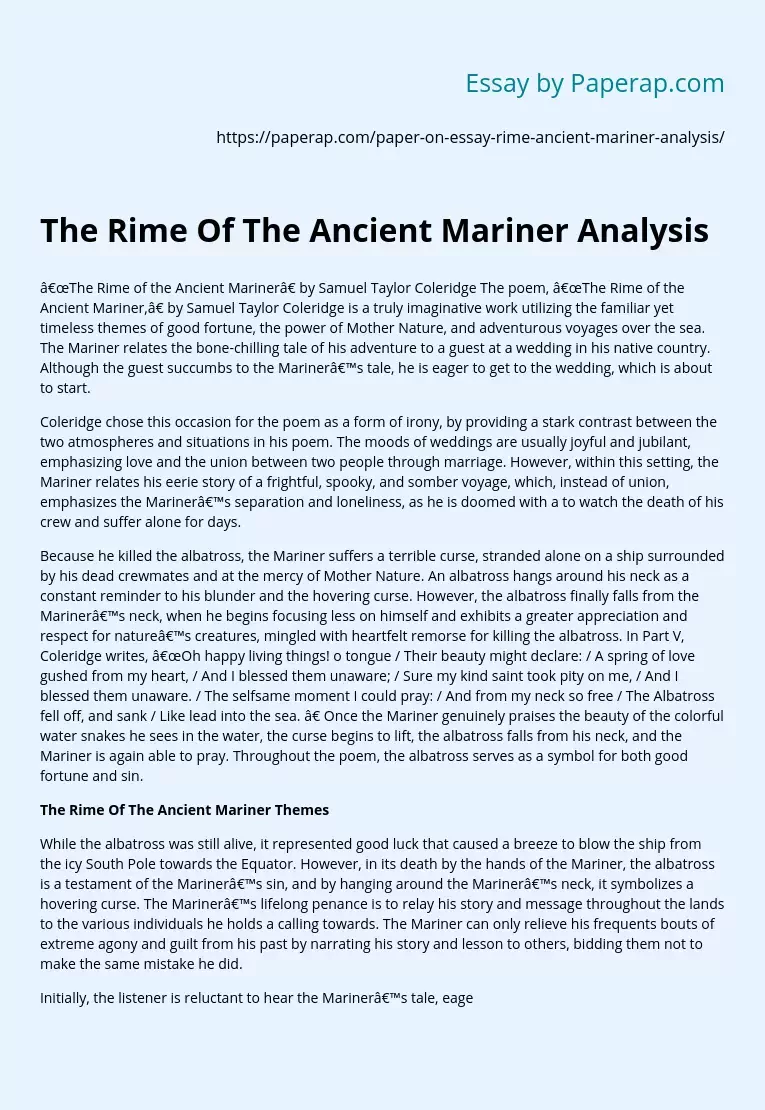The Rime Of The Ancient Mariner Analysis
“The Rime of the Ancient Mariner” by Samuel Taylor Coleridge The poem, “The Rime of the Ancient Mariner,” by Samuel Taylor Coleridge is a truly imaginative work utilizing the familiar yet timeless themes of good fortune, the power of Mother Nature, and adventurous voyages over the sea. The Mariner relates the bone-chilling tale of his adventure to a guest at a wedding in his native country. Although the guest succumbs to the Mariner’s tale, he is eager to get to the wedding, which is about to start.
Coleridge chose this occasion for the poem as a form of irony, by providing a stark contrast between the two atmospheres and situations in his poem. The moods of weddings are usually joyful and jubilant, emphasizing love and the union between two people through marriage. However, within this setting, the Mariner relates his eerie story of a frightful, spooky, and somber voyage, which, instead of union, emphasizes the Mariner’s separation and loneliness, as he is doomed with a to watch the death of his crew and suffer alone for days.
Because he killed the albatross, the Mariner suffers a terrible curse, stranded alone on a ship surrounded by his dead crewmates and at the mercy of Mother Nature. An albatross hangs around his neck as a constant reminder to his blunder and the hovering curse. However, the albatross finally falls from the Mariner’s neck, when he begins focusing less on himself and exhibits a greater appreciation and respect for nature’s creatures, mingled with heartfelt remorse for killing the albatross.
In Part V, Coleridge writes, “Oh happy living things! o tongue / Their beauty might declare: / A spring of love gushed from my heart, / And I blessed them unaware; / Sure my kind saint took pity on me, / And I blessed them unaware. / The selfsame moment I could pray: / And from my neck so free / The Albatross fell off, and sank / Like lead into the sea. ” Once the Mariner genuinely praises the beauty of the colorful water snakes he sees in the water, the curse begins to lift, the albatross falls from his neck, and the Mariner is again able to pray. Throughout the poem, the albatross serves as a symbol for both good fortune and sin.
The Rime Of The Ancient Mariner Themes
While the albatross was still alive, it represented good luck that caused a breeze to blow the ship from the icy South Pole towards the Equator. However, in its death by the hands of the Mariner, the albatross is a testament of the Mariner’s sin, and by hanging around the Mariner’s neck, it symbolizes a hovering curse. The Mariner’s lifelong penance is to relay his story and message throughout the lands to the various individuals he holds a calling towards. The Mariner can only relieve his frequents bouts of extreme agony and guilt from his past by narrating his story and lesson to others, bidding them not to make the same mistake he did.
Initially, the listener is reluctant to hear the Mariner’s tale, eager to get to the wedding that is about to begin. However, the listener is somehow drawn to the Mariner and yields to his tale. He becomes enchanted, and by the tale’s end, the listener is left, shocked, speechless, and in awe. He gains a new perspective of the world, and the poem ends with the words, “He [the listener] went like one that hath been stunned / And is of sense forlorn; / A sadder and a wiser man, / He rose the morrow morn. ” The Mariner’s tale suggests a larger lesson about human life, expressing that humans are not superior to the rest of Creation and nature.
Humans and all other life are equal inhabitants on planet Earth and must therefore treat each other with respect and appreciation. It is vital to appreciate nature’s beauty for the magnificent gift it truly is, and one can only express true devotion and faith to God through prayer by respecting his Creation. Love for God only exists if humans love the life around them. This lesson regarding nature can be related to the message and plot within Mary Shelley’s novel, Frankenstein or The Modern Prometheus, because the main characters within both novels reveal a blatant disregard for nature and the harmony of life.
In Coleridge’s poem, the Mariner disrespects nature and God’s Creation by killing the albatross upon whim – a beautiful bird that grants the crew and ship good luck. Similarly, Dr. Frankenstein disregards nature by creating his own human life. He attempts to assume God’s power of Creation in an unnatural, almost perverse form, by creating another life for his own curiosity and satisfactions, without any consideration for the consequences.
Both characters also suffer from “curses” of sorts. The Mariner’s crew drops dead, and the Mariner is forced to spend days surrounded by his dead crew stranded upon the ship in the middle of nowhere. Similarly, Dr. Frankenstein’s monster escapes and “haunts” Frankenstein causing disaster throughout his home town, such as the murder of his little brother. In conclusion, both works express the significance of appreciating the beauty of nature and all God’s Creation.
The Rime Of The Ancient Mariner Analysis. (2019, Dec 05). Retrieved from https://paperap.com/paper-on-essay-rime-ancient-mariner-analysis/

